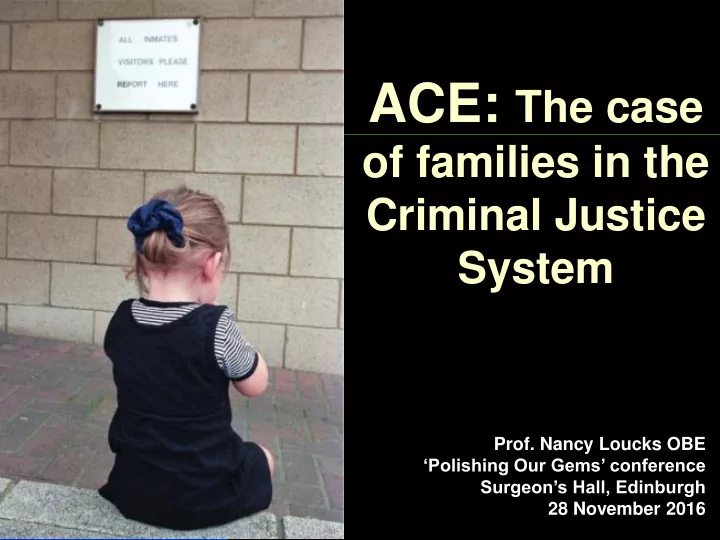

ACE: The case of families in the Criminal Justice System Prof. Nancy Loucks OBE ‘Polishing Our Gems’ conference Surgeon’s Hall, Edinburgh 28 November 2016
HOUSING PHYSICAL & FINANCE & MENTAL HEALTH BENEFITS CHILDREN & VICTIMS YOUNG PEOPLE PRISONERS’ FAMILIES CRIMINAL CRIME JUSTICE PREVENTION TRAVEL & EDUCATION TRANSPORT
HALF of men in prison and TWO-THIRDS of women have children under the age of 18 An estimated 27,000 children in Scotland have a parent go to prison each year
A THIRD of children in Scotland whose parent is arrested witness the arrest Imprisonment of a parent recognised as an ACE, “but with a unique combination of trauma, shame, and stigma”, increased when the child also witnesses the arrest. - Tilley-Riley 2016: 10
Impact of Parental Arrest (Adalist Estrin, 2006) Fear Guilt Worry Embarrassment Confusion Isolation Sadness Anger Often accompanied by: Feeling blamed Stigma and shame ‘Conspiracy of silence’ Conflicts of loyalty (what is right and wrong)
Trauma An incident can be traumatic to someone if it carries a threat against life, physical well being, or personal security. Anxiety, helplessness, anger, intense terror, shock Children are particularly sensitive to the traumatic experiences of their parents, especially if they perceive the event to be a danger to their parent. National Center for Traumatic Stress
Trauma An incident can be traumatic to someone if it carries a threat against life, physical well being, or personal security. Anxiety, helplessness, anger, intense terror, shock Children are particularly sensitive to the traumatic experiences of their parents, especially if they perceive the event to be a danger to their parent. National Center for Traumatic Stress
Impact on Children Infants are afraid of: Strangers Loud or sudden noises Loss of support Separation from parents Toddlers are afraid of: Anything or anybody new, different or unpredictable The dark, unexpected noises, dogs Being restrained, loss of autonomy Separation from parents
Impact on Children Preschoolers (3-5 years) feel: Loss of control & powerlessness Guilt & worry about the parent / caregiver Scared of the unknown Loyalty conflicts Need to make sense of the situation
Impact on Children School age children (5 – 8 years) feel: Afraid of being blamed Worried about their own safety Concerned that parents can’t take care of them Tempted to be ‘bad’ so they can go to jail Powerlessness when logic fails them
Impact on Children Pre-teens (9-11 years) feel: Suspicious – they know what you see is not always what you get Scared of being implicated or blamed or questioned by police Worry about getting ‘lost in the system’ Often nervous about the police presence and protective of property
Impact on Children Teens may: Size up the situation based on their role in the family Feel blamed, implicated, responsible, threatened or relieved Take all comments about them or their family personally Often exert some power & control over the situation by trying to leave, or engaging in a power struggle with parents or police
25-30% of children with a parent in prison develop significant mental health problems, compared to 10% of children in the population in general 65% of boys with a convicted parent go on to offend themselves
Children of Imprisoned Parents Higher risk of future imprisonment Higher risk of problems with physical and mental health Regressive behaviour/grief responses
‘Disenfranchised grief’ … the grief experienced by those who incur a loss that is not, or cannot be, openly acknowledged, publicly mourned or socially supported. Doka (1999)
I'm feeling sad at the moment. My dad went to prison recently, and I'm not sure when he's coming back. My mum's really upset about it. Sometimes she's so depressed that she doesn't get out of bed, she just lays there still for the whole day. It's difficult for me when she does that, because I don't know how to cook my own dinners. I think my mum needs help, but I don’t know what to do. I don’t know who I should talk to. - young girl
Things aren't good at home. My mum drinks a lot, and my dad's in prison. I get so angry. I want to be a better person, but I've got myself involved with the wrong crowd. It's got me in a lot of trouble with the police - mainly for fighting. I realise what I'm doing isn't right, so I'm trying to come away from the group, but it's difficult. I know what they're capable of, so I'm scared for my safety. I just don't want to be like this anymore. I don't want to hurt people. - teenage boy
Amongst the group with the most complex needs… almost 60% either lived with children or had ongoing contact… This clearly demonstrates that there may be children involved in an environment where it is not immediately obvious. … importance of successful co - ordinated interventions with this group. - Couper & Mackie 2016: 22, citing Lankelly Chase Foundation (2015)
Child impact assessments should be conducted whenever considering placing or releasing parents from custody. Non-custodial sentences should also be assessed for their impact on children. When a sentence causes parents to be separated from children for whom they are caring, they should be given sufficient time to make arrangements for those children.
Criminal Justice (Scotland) Act 2016 Chapter 3, para. 107: When [after] someone goes to prison, “ (2) The Scottish Ministers must ensure that the person is asked — (a) whether the person is a parent of a child, and (b) if the person claims to be a parent of a child, to — (i) state the identity of the child, and (ii) give information enabling the identity of the service provider in relation to the child to be ascertained.” … and to share that information with the Named Person
What does this have to do with us? Plan Ask Listen & Learn
ACE: The case of families in the Criminal Justice System Nancy.Loucks@familiesoutside.org.uk
Recommend
More recommend